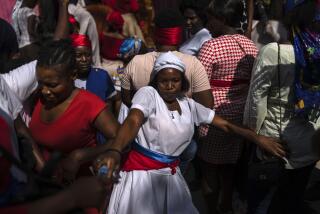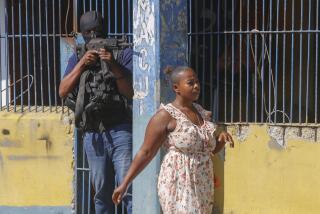Haiti Was a Family Affair : Terror, Ritual Kept Duvaliers in Power
- Share via
WASHINGTON — The dictatorial rule of the Duvalier family in Haiti has been a fixture in the Caribbean for most of the past three decades.
It began in 1957, with the accession to power of Francois (Papa Doc) Duvalier, a country doctor who was chosen president in a popular election, and ended Friday, when a U.S. Air Force C-141 took off at 3:46 a.m., carrying Duvalier’s son and successor, Jean-Claude, into exile.
The senior Duvalier, contrary to what had been expected of him, began a reign of repression. He executed many of his opponents and drove others into exile.
He ruled with the help of his knowledge of voodoo, a religious practice rooted in the animist sects of West Africa that came to the New World with the slaves brought to Haiti by the French in the 18th Century. And much of his repression was administered by a gang of loyal thugs known as Tontons Macoutes--Creole for “bogeymen”--organized by the senior Duvalier soon after he took office as a counterweight to the army, which he feared would try to depose him.
In 1964, he had himself designated president-for-life, and seven years later, as he was dying, he ordered the constitution altered so that he could designate his son, Jean-Claude, then 19, his successor as president for life.
Francois Duvalier, the son of a schoolteacher, graduated from the University of Haiti medical school in 1934 and worked in the 1940s for a U.S.-financed campaign to eradicate yaws, an endemic skin disease. After building a political following as a young doctor in rural areas, Duvalier won Cabinet posts in the late 1940s. But when Gen. Paul Magloire seized power in a 1950 coup, Duvalier went into opposition and was forced to go underground.
In 1956, Magloire was overthrown, and six interim governments followed, until a three-way election took place, and Duvalier won an overwhelming victory.
Within months of his inauguration, hundreds of political opponents had been jailed and 300 people were said to have been slain by the Tontons Macoutes--enforcers in dark suits, dark hats and dark glasses (“animals,” a woman in exile here called them). Press criticism was silenced and the army was purged.
Support From Washington
Duvalier was supported by Washington as a staunch anti-communist, and in 1959 the United States sent a medical team to Haiti to help him recover from a severe heart attack.
Over the years, opposition forces in exile in New York and Miami tried on several occasions to put an invasion force ashore in Haiti, but they were never strong enough, and Duvalier defeated them without difficulty.
Uncounted numbers of Haitians have fled the country, many of them in fragile, often unseaworthy craft intercepted by the U.S. Coast Guard.
Duvalier was reported on occasion to have impaled the heads of his slain enemies on spikes for public display. And once, after six teen-agers painted “Down With Duvalier” on a wall in the capital, the elder Duvalier had them sentenced to death and ordered the Boy Scouts disbanded, along with other youth groups.
The constitution established by Duvalier and rewritten by his son, who is widely known as Baby Doc, gave the president control over the official police force, the army and the militia, and assigned to him the roles of head of state and head of government. But students of Haitian affairs say the power of the Duvalier dynasty rested on its ability to control the impoverished population through a reign of terror.
Still Poorest Nation
When the elder Duvalier came to power, Haiti was the poorest nation in the Americas, and it is still the poorest today. Its literacy rate ranks at the bottom.
Shortly after Duvalier declared himself re-elected in 1961, President John F. Kennedy ordered aid slashed to about $1.5 million a year. Subsequent revisions of the U.S. government’s attitude toward Haiti have resulted in restoration of assistance, subject to an improvement in the dynasty’s doleful record on human rights.
At present, $26 million in economic aid has been placed on hold, and before Jean-Claude Duvalier’s flight Friday, U.S. officials were dubious about its being released. Food aid of $25 million is not subject to human rights compliance restrictions, but it has been largely untapped, and only about $500,000 in military aid has been delivered in recent times.
When the younger Duvalier took office, on April 21, 1971, he was widely regarded as unlikely to last long in the jungle of palace politics in which his mother, Simone, and older sister, Marie-Denise, were experienced practitioners. Nearly 15 years later, however, young Duvalier was still in power and the two women had disappeared from the palace circle.
Power Behind the Throne
In their place was Michele Bennett, the American-educated daughter of a wealthy Creole family. She became the power behind the president through her marriage to Jean-Claude on May 20, 1980. There were reports that the wedding cost $2 million, but the reports were vigorously denied by the bride in a Times interview last year.
Although poverty-stricken Haitians continued to risk death in order to escape from their homeland--the most recent sinking boatload of refugees was rescued by the U.S. Coast Guard off the Florida coast last month--Duvalier told Times staff writer Bella Stumbo that the political stability he had achieved was attracting U.S. investors. He said he had invested $800 million over the preceding 12 years in the construction of two new ports, 350 miles of modern roads and the improvement of airports and communications.
But the economy continued to suffer as tourism, which once provided much of the country’s foreign currency earnings, almost dried up--a result of Haiti’s being listed in 1984 as one source of the fatal disease AIDS.
‘Sacked National Treasury’
According to Peter Brandriss, a member of the staff of the Council on Hemispheric Affairs, the Duvalier family “threw Haiti back into incredible impoverishment (and) sacked the national treasury.”
He said a report prepared by the World Bank in 1984 found that approximately 4,000 families received incomes greater than $90,000, but only 17 people in the nation declared taxable income in excess of $40,000.
Given the years of repression and grinding poverty, why did it take so long for the public to become openly restive?
“These are people who haven’t thought in terms of being able to stand up and be represented in government,” Brandriss said. “The people who do speak out are repressed.”
More to Read
Sign up for Essential California
The most important California stories and recommendations in your inbox every morning.
You may occasionally receive promotional content from the Los Angeles Times.













